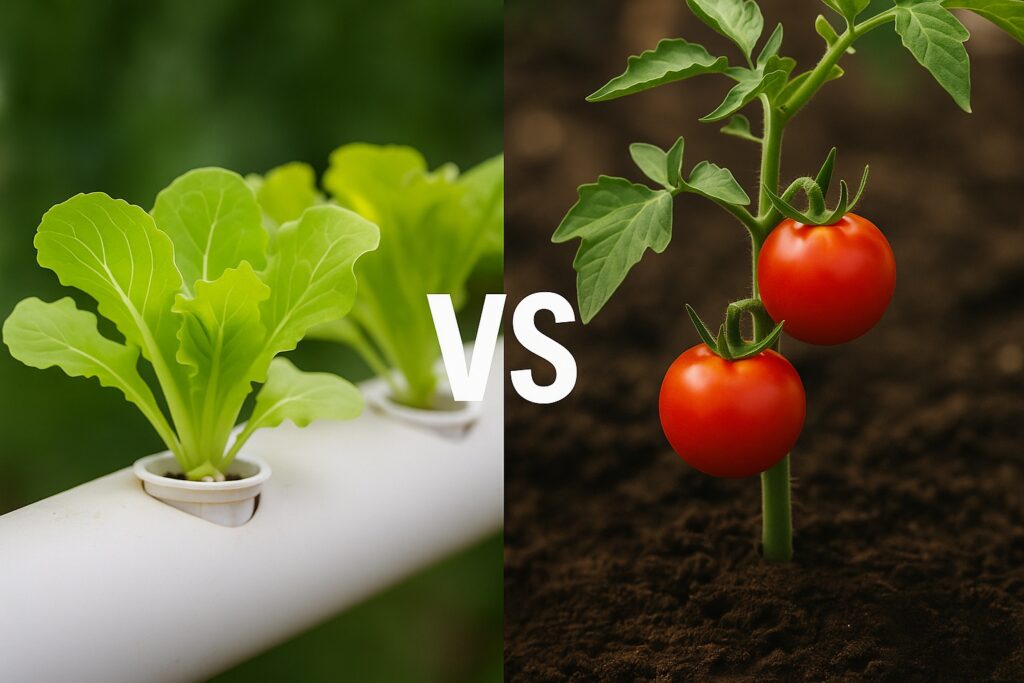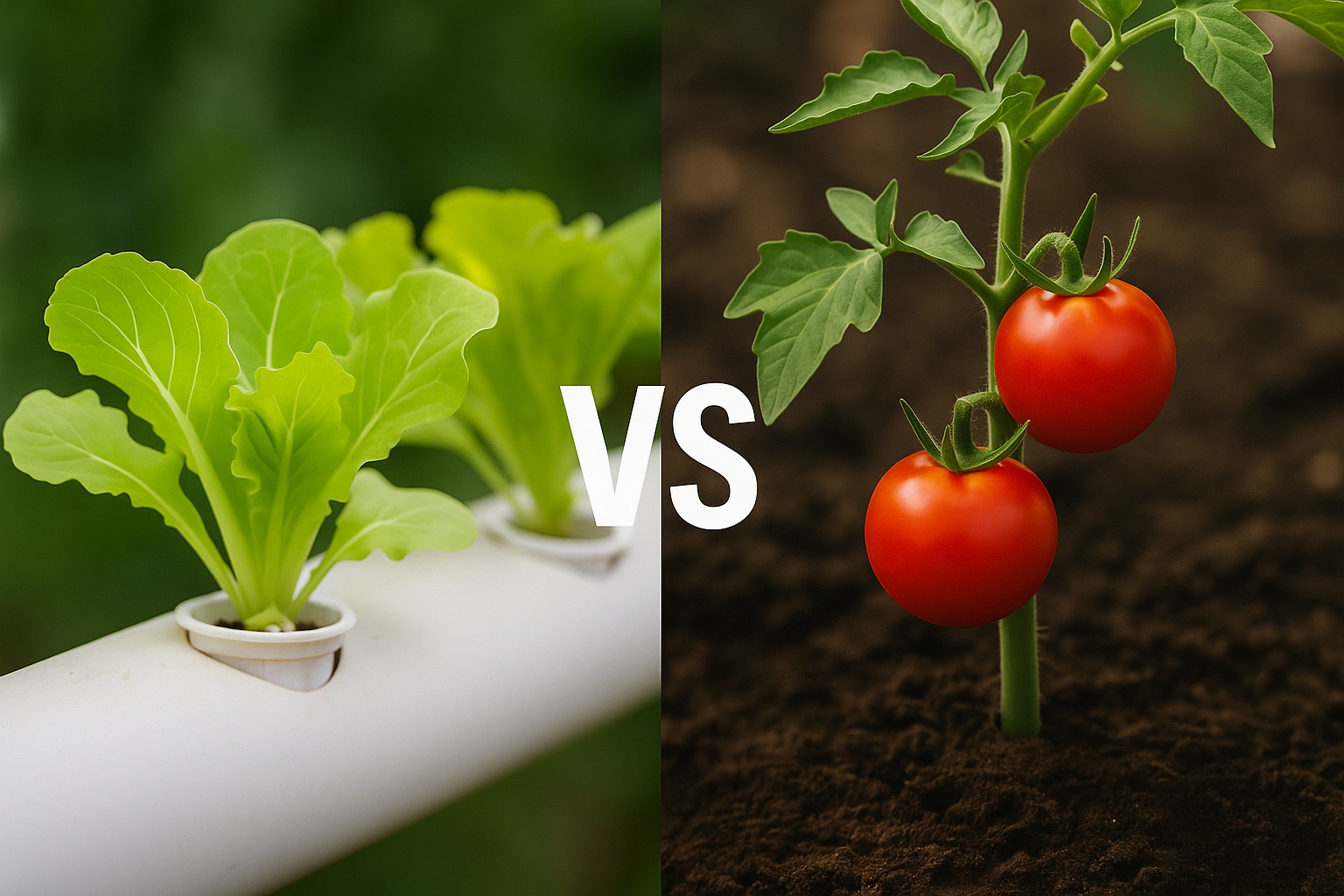
Farming and home growing have always involved choices — what to plant, when to sow, and most importantly, how to grow.
One of the biggest debates today is hydroponics vs soil growing: should you stick with traditional compost and beds, or switch to a high-tech, soilless system?
With sustainability, energy efficiency, and year-round control becoming bigger priorities, many UK growers are re-evaluating how they cultivate their food.
1️⃣ Understanding Your Options
Soil growing is the classic approach — using earth or compost-based mixes to support plants, feed microbes, and regulate water naturally.
Hydroponics replaces soil with a nutrient-rich water solution, feeding plants directly through their roots for faster, more controlled growth.
Both have passionate advocates, and both can deliver excellent harvests when done right.
2️⃣ How Hydroponics Works
In a hydroponic system, roots sit in oxygenated, nutrient-balanced water rather than soil.
This allows exact control over pH, electrical conductivity (EC), and nutrient balance — factors that directly influence yield and quality.
Common Hydroponic Systems
- NFT (Nutrient Film Technique) – A thin film of nutrient solution flows over plant roots, ideal for leafy greens.
- DWC (Deep Water Culture) – Roots hang in an aerated nutrient tank, delivering explosive growth.
- Ebb & Flow / Flood & Drain – Plants are periodically flooded and drained to deliver oxygen and nutrients.
- Wick Systems – Simple, passive setups for herbs and small plants.
- Vertical Towers – Stacked planters that save space — popular for indoor and urban gardens.
Hydroponics excels where space, light, or weather are limited — perfect for UK flats, garages, or greenhouses.
3️⃣ How Soil Growing Works
Soil (or “substrate”) provides structure, moisture retention, and natural microbial life.
Roots exchange nutrients with living organisms that enhance flavour and resilience.
Modern Soil Mixes
Peat-free composts, coco coir, perlite, and composted bark are replacing traditional peat due to sustainability goals in the UK.
These substrates balance aeration and moisture, reducing runoff and improving biodiversity.
Soil remains the go-to medium for gardeners seeking organic practices and the complex flavour that comes from rich microbial activity.
4️⃣ Scientific Comparison: Hydroponics vs Soil Growing Results
A 2021 study in Scientia Horticulturae found that hydroponically grown tomatoes had higher lycopene and β-carotene levels and better water-use efficiency than soil-grown plants (Sci Hortic. 279:109896).
This supports what many growers observe in practice — hydroponics grows faster and uses less water, while soil often wins on taste and sustainability.
| Aspect | Hydroponics | Soil Growing |
|---|---|---|
| Growth Rate | Faster – direct nutrient uptake | Slower – depends on soil health |
| Yield Potential | Typically higher | Moderate |
| Water Use | Up to 90 % less (recycled) | Higher, some lost to runoff |
| Nutrient Content | Higher carotenoids in tomatoes (Sci Hortic 2021) | Variable, soil-dependent |
| Flavour & Aroma | Clean, mild | Often richer and more complex |
| Energy Input | Requires pumps/lights | Mostly sunlight |
| Setup Cost | Higher upfront | Lower |
| Ease of Use | Needs monitoring | More forgiving |
| Pests & Disease | Fewer soil-borne issues | Can host pests/fungi |
| Space Efficiency | Vertical options | Requires more area |
5️⃣ Pros and Cons of Hydroponics vs Soil Growing
🌿 Soil-Based Growing
Pros
- Lower initial cost
- Intuitive and forgiving for beginners
- Wider variety of crops
- Often better flavour and aroma
Cons
- Slower growth and lower yield
- Needs more land and water
- Weather- and pest-dependent
- Can degrade if poorly managed
Prefer to grow in soil? Our Best Soil for Growing Food Indoors in the UK roundup compares composts and mixes ideal for indoor growing.
💧 Hydroponics
Pros
- Higher yields and faster growth
- Uses far less water
- Space-saving and climate-proof
- Cleaner, fewer soil pests
Cons
- Higher setup and energy costs
- Technical learning curve
- Risk of failure during power cuts
- Requires specific nutrient mixes
Looking to get started? Check out our Best Hydroponic Growing Systems UK guide for top-rated beginner and advanced setups.
6️⃣ Nutrient and Fertilizer Needs
Hydroponic and soil systems speak different nutritional languages.
- Hydroponics: uses fully water-soluble nutrients that dissolve instantly and deliver precise feeding (N-P-K + trace elements).
- Soil: benefits from slow-release or organic fertilizers that feed the medium and microbes as well as the plant.
For hydroponics, look for “A & B” nutrient kits or complete hydroponic formulas.
For soil, compost, fish blood and bone, and liquid tomato feeds like Tomorite are reliable UK options.
7️⃣ Environmental & Sustainability Factors
Hydroponics wins on water conservation, but requires electricity for pumps and lights.
Soil systems are more natural and energy-light, but can cause runoff pollution if mis-managed.
Peat-free composts and renewable power sources can make both greener.
Hybrid setups are emerging: hydroponic herbs indoors through winter, soil beds outdoors in summer — the best of both worlds for self-sufficient UK growers.
8️⃣ Which System Is Right for You?
Choose soil if:
- You’re a beginner or on a tight budget.
- You enjoy organic, hands-on gardening.
- You value traditional flavour and microbial benefits.
Choose hydroponics if:
- You want high yields in limited space.
- You grow indoors or year-round.
- You like data-driven precision and automation.
9️⃣ Final Thoughts
Hydroponics and soil each have clear strengths. Hydroponics offers precision, speed, and efficiency, while soil rewards patience with flavour and ecological balance.
Many UK growers now blend both approaches — hydroponic greens inside, soil-grown crops outside — for resilience and self-sufficiency all year round.
Learn more about hydroponic systems from the Royal Horticultural Society.
🌱 Related Articles
Grow Light Guides You Might Like
- Top 10 LED Grow Lights UK (2025) – Our latest comparison of LED grow lights for every budget and growing setup.
- Best Cheap Grow Lights UK – Affordable grow lights that actually work for seedlings and houseplants.
- Best Grow Lights for Every Tent Size (UK Guide 2025) – Find the ideal light coverage for small, medium, and large grow tents.
Indoor Growing & Propagation Guides
- Best Soil for Growing Food Indoors in the UK – Discover the top peat-free mixes for healthy, productive indoor gardens.
- How to Grow Plants from Seed (UK Guide) – Learn step-by-step seed sowing and propagation methods for beginners.
Compare Growing Methods
- Hydroponics vs Soil Growing UK – See how hydroponic and soil setups differ in cost, yield, and maintenance.
Looking for more indoor growing and self-sufficiency ideas? Visit the HomeGrower homepage for our newest guides and reviews.
🏡 Explore More HomeGrower Hubs
Dive deeper into our core growing and self-sufficiency guides:
- Indoor Growing UK
Everything you need to grow herbs, vegetables and microgreens indoors all year round. - Grow Lights UK
Compare LED, fluorescent and full-spectrum grow lights for home growers. - Grow Tents UK
Reviews, setup guides and ideal tent sizes for beginners and experienced growers. - Outdoor Growing UK
Advice on raised beds, irrigation, composting and year-round food production. - Greenhouses & Polytunnels UK
Expert guidance for choosing, installing and using protected growing structures. - Garden Sheds UK
Buying guides, comparisons and storage advice for every UK garden. - Garden Tools & Equipment UK
Essential tools, equipment reviews and buying guides for efficient gardening. - Food Preservation UK
Learn dehydration, fermentation, freezing and long-term storage of home-grown produce. - Self-Sufficiency UK
Guides to home solar, emergency power, rainwater collection, off-grid watering and low-energy systems for more resilient living.
Or return to the HomeGrower homepage to browse all our latest guides and reviews.
❓ Hydroponics vs Soil Growing: FAQs
What are the main differences between hydroponics vs soil growing?
The biggest difference between hydroponics vs soil growing is that hydroponics feeds plants through a nutrient-rich water system, while soil growing relies on organic matter and microbes. Hydroponics gives faster growth and higher efficiency, while soil growing supports natural flavour and biodiversity.
Is hydroponics better than soil for beginners?
For most beginners, soil growing is easier because it’s more forgiving of mistakes. However, small home hydroponic kits have made hydroponics vs soil growing a closer contest — many new UK gardeners now start with simple hydroponic herbs before expanding into soil beds outdoors.
Which method gives better-tasting food — hydroponics or soil?
When comparing hydroponics vs soil growing, soil often wins for flavour. That’s because natural soil microbes and minerals influence taste. Hydroponic crops can still be delicious — especially with balanced nutrients — but soil-grown tomatoes and herbs often have deeper aroma and complexity.
Does hydroponics use less water than soil growing?
Yes. Studies show that hydroponics growing systems can use up to 90% less water because the solution is recycled instead of lost through runoff or evaporation. This makes hydroponics a sustainable choice for indoor and urban growers in the UK.
Which is cheaper — hydroponics or soil growing?
In terms of setup, soil growing is cheaper to start. Hydroponics vs soil growing long-term costs can balance out though, as hydroponic systems reduce water and fertiliser waste and can produce more crops per square metre.
Can I combine hydroponics and soil growing?
Absolutely. Many UK growers now use a hybrid approach — hydroponics vs soil growing doesn’t have to be either/or. You can grow leafy greens hydroponically indoors during winter and switch to soil beds or containers in summer for root vegetables and fruiting plants.
Which is more sustainable in the UK — hydroponics or soil growing?
Both methods can be sustainable if managed well. Hydroponics vs soil growing sustainability depends on your setup: hydroponics saves water but needs power, while soil supports pollinators and soil life when kept peat-free and organic.
